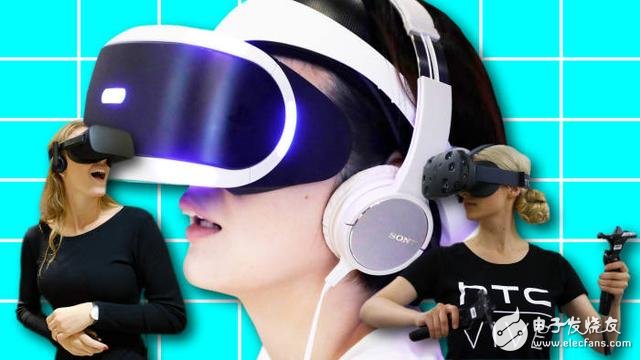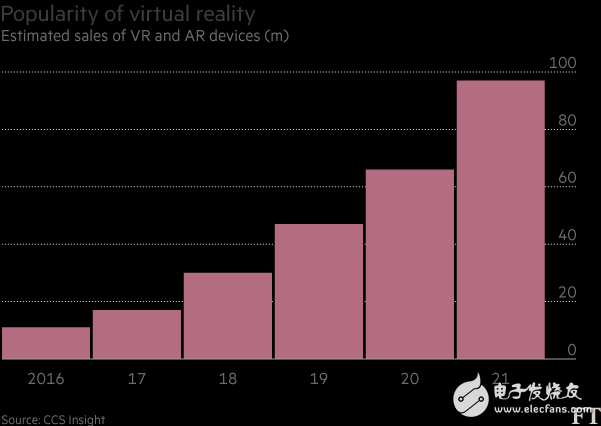The Financial Times recently wrote that VR vendors have found themselves chasing a complex new game: anticipation. Although there are technology giants including Sony, Google, and Facebook, as well as numerous start-ups and independent developers developing applications for VR helmets, the VR market has not yet reached their expectations. As video game creators gather in San Francisco to attend the annual Game Developers Conference this week, many industry insiders are annoyed that VR technology may take longer to reach mainstream audiences. Especially after Facebook bought Oculus VR for $2 billion three years ago, this kind of trouble has become more and more obvious. In the increasingly fierce competition, Oculus seems to have lost its early advantages in pioneering the next generation of VR technology. Among the high-end helmets that offer rich graphics and the most immersive experience, Sony's PlayStaTIon VR has become an obvious market leader in terms of shipments. Many analysts and developers believe that Oculus Rift is currently far behind PlayStaTIon VR, ranking third in the market, behind HTC's VR helmet Vive. Neither HTC nor Oculus disclosed sales data, but Sony said on Monday that it has sold 915,000 PlayStaTIon VR helmets for $400 since its launch in October last year. Some industry insiders expect this to mean that PlayStaTIon VR sales may be more than three times that of the Oculus Rift. Andrew House, global CEO of Sony Interactive Entertainment, told the Financial Times that demand for PlayStation VR exceeded supply, and Sony is working hard to increase production capacity. “With nearly 1 million sales, we are pleasantly surprised by the speed of the PlayStation VR and firmly believe that this product has established a leading edge in this exciting new market.†At the same time, however, many analysts have been reducing their overall expectations for the VR market. Market research firm CCS Insight expects to sell 11 million VR and augmented reality devices in the global market in 2016, most of which are cheap smartphone viewing devices, such as Google's Cardboard and Samsung Electronics' Gear VR. CCS Insight believes that only 1.2 million dedicated VR devices are used in conjunction with PCs or video game consoles. "These data are much lower than our previous expectations," CCS Insight said in a report on Friday. “In 2016, the market growth rate was lower than expected, let us push the peak time of VR equipment by one year.†CCS Insight pointed out that in addition to the high price of devices such as Oculus Rift and Vive, and the need for high-end PCs to support them, "limited content" also constrained the development of the VR industry. “I don’t think anyone has developed a fascinating app for VR,†said Minal Hasan, co-founder of venture capital firm K2 Global, who invested in the augmented reality helmet Magic Leap. “We have a few years away from the major breakthroughs in the projected content.†While some developers who have raised millions of dollars and want to develop VR apps are hot, some independent game studios are showing that as long as cost management is achieved, popular VR games can make money. Tipatat Chennavasin, a partner at The Venture Reality Fund, an investment firm focused on investing in VR, expects at least eight VR games to generate more than $1 million in revenue to date. Chennavasin said, "Although the adoption of VR technology is lower than our expectations, in fact, people investing in VR will continue to create a healthy ecosystem for VR developers." Among these elite teams are Owlchemy Labs, the developer of the VR game Job Simulator. Owlchemy Labs, based in Texas, said last month that the company had received $3 million in revenue. Another VR game, Raw Data, received $1 million in revenue in the first month of its launch. Chennavasin said that the high price of hardware means the participation of high-end users. However, unlike the fiery situation a year ago, the market has gradually become flat. Chennavasin, "This is not a gold rush, not all developers can make money." The background of Job Simulator's game is that in 2050, robots have replaced human work, and gamers can choose to be the chef, white-collar or convenience store clerk to accept the robot's mission. With the handle, you can take, grab, lick and throw things. Basically, some of the actions you can do in life can be done in the game with the handle. Part of the success of the game stems from the early use of the first dynamic sensor gamepad that appeared in the HTC Vive. The Oculus-like Touch handle was not sold until last December, and it was one of a series of products that Oculus deferred for sale last year. According to sources, Oculus has not been able to make a seamless transition from a startup to a Facebook subsidiary as the number of employees has soared. A former employee who had worked for Oculus for several years said, “It looks a mess. In fact, HTC is everywhere, and Oculus should have been overwhelming them for a year and a half ahead of other competitors.†After restructuring in December last year, Oculus's former chief executive, Brendan Iribe, stepped down and focused on the development of the Oculus Rift helmet. Last month, Facebook appointed Xiaomi's former executive Hugo Barra to take charge of the company's entire VR business. Jason Rubin, vice president of content at Oculus, told the media at the game developer conference this week that the number of employees has soared from dozens to hundreds before the company restructured. Rubin declined to say whether Oculus was having trouble retaining employees, but said that since the acquisition of the company by Facebook for three years, "many things have changed from the management's point of view, and management needs to be adjusted." "I think Oculus has grown from a startup to a larger company with the ability to launch a second device. It is necessary to make VR the next generation computing platform," Rubin said. In Facebook's previous earnings conference call, company co-founder and CEO Mark Zuckerberg hinted that Oculus's speed of development made him unsatisfied. He said that even after the sale of Gear VR reached 5 million units, the delayed release of Rift and Touch was obviously disappointing. Gear VR is a smartphone-based helmet product launched by Samsung Electronics and Oculus. Zuckerberg said, "I urge investors to continue to be patient, because we have invested heavily in the VR field, and this investment will not bring us returns or real profits for a long time.
UK Recessed Tabletop Socket be with Britain type plug,could be selected to be with USB ports,Internet ports,Phone ports,overload protection and with or without switch.
UK Recessed Tabletop Socket can be set into furniture and office furniture like table,cabinet and so on.It will be easily to use the charging for Phone and home appliance.
Specifically, We have our own design and production team for USB Circuit Board design and produce.
Switch Port,UK Recessed Tabletop Socket,UK HidDEn Mounted Power Outlets,UK Flush Mount Socket Dongguan baiyou electronic co.,ltd , https://www.dgbaiyou.com
